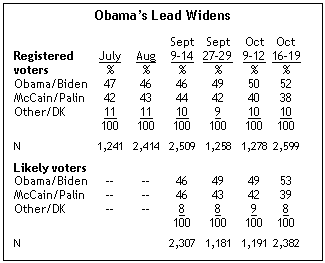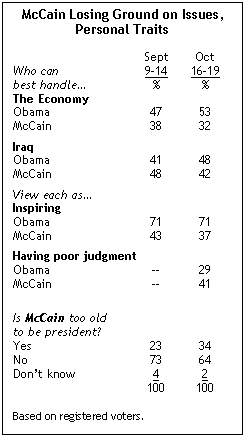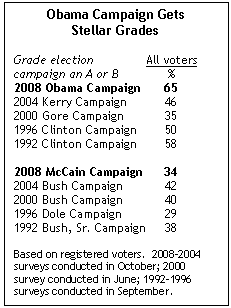Overview

Barack Obama’s lead over John McCain has steadily increased since mid-September, when the race was essentially even. Shortly after the first presidential debate on Sept. 26, Obama moved to a 49% to 42% lead; that margin inched up to 50% to 40% in a poll taken just after the second debate. Currently, Obama enjoys his widest margin yet over McCain among registered voters, at 52% to 38%. When the sample of voters is narrowed to those most likely to vote, Obama leads by 53% to 39%.
Obama’s strong showing in the current poll reflects greater confidence in the Democratic candidate personally. More voters see him as “well-qualified” and “down-to-earth” than did so a month ago. Obama also is inspiring more confidence on several key issues, including Iraq and terrorism, than he did before the debates. Most important, Obama now leads McCain as the candidate best able to improve economic conditions by a wider margin (53% to 32%).

Obama’s gains notwithstanding, a widespread loss of confidence in McCain appears to be the most significant factor in the race at this point. Many more voters express doubts about McCain’s judgment than about Obama’s: 41% see McCain as “having poor judgment,” while just 29% say that this trait describes Obama. Fewer voters also view McCain as inspiring than did so in mid-September (37% now, 43% then). By contrast, 71% of voters continue to think of Obama as inspiring.
The latest national survey by the Pew Research Center for the People & the Press, conducted Oct. 16-19 among 2,599 registered voters interviewed on landline phones and cell phones, finds that McCain’s age also has become more of an issue for voters. Roughly a third (34%) now says that McCain is too old to be president; in the Sept. 9-14 survey, just 23% said this. At this stage in the 1996 campaign, about as many voters (32%) said Republican candidate Bob Dole was too old to be president.
In addition, Sarah Palin appears to be a continuing – if not an increasing – drag on the GOP ticket. Currently, 49% of voters express an unfavorable opinion of Palin, while 44% have a favorable view. In mid-September, favorable opinions of Palin outnumbered negative ones by 54% to 32%. Women, especially women under age 50, have become increasingly critical of Palin: 60% now express an unfavorable view of Palin, up from 36% in mid-September. Notably, opinions of Palin have a greater impact on voting intentions than do opinions of Joe Biden, Obama’s running mate.

McCain may also be getting hurt by opinions of his campaign. A large majority of voters (64%) give McCain a grade of C or lower for his efforts to convince people to vote for him; only about a third (34%) gives McCain a grade of A or B for his campaign efforts. These grades are lower than those accorded to George Bush during his two successful campaigns and are nearly as low as the grades for Dole’s campaign in 1996 (29% A or B).
Obama, by contrast, receives the highest grades for a campaign dating to 1992. Nearly two-thirds of voters (65%) grade Obama’s efforts at convincing people to vote for him at A or B; about a third (32%) give Obama’s campaign a grade of C or lower.
A steadily growing number of voters say that McCain has been too personally critical of Obama: 56% say that now, up from 42% in mid-September. By contrast, just 26% say that Obama has been too personally critical of McCain, which is largely unchanged from mid-September (28%).

In recent weeks, McCain has lost support across the board. Most notably, he now trails Obama decidedly among political independents (51% to 33%). Yet he also has lost support among some voting blocs that previously had been strongly in his corner, including white evangelical Protestants and white men. McCain continues to lead Obama among older white men, but even here his margin over Obama has narrowed since mid-September; McCain now leads among white men age 50 and older by 54% to 38%, down from a 27-point lead in mid-September.
For all of Obama’s current success, however, there are some signs of vulnerability for his candidacy that could present opportunities for McCain. First, while somewhat more voters see Obama as well-qualified than did so in mid-September, only about half (53%) say this trait describes him; 72% say McCain is well-qualified. Second, swing voters continue to represent nearly a quarter of the electorate (23%). Notably, swing voters are less likely than all voters to say that McCain would continue Bush’s policies. They also express far more confidence in McCain than Obama to handle national security issues.

Voter interest in the campaign remains extraordinary: fully 81% continue to say that they have given a lot of thought to the presidential election, the highest ever measured at this stage in a campaign. The same percentages of Republican and Democratic voters say they are giving a lot of thought to the election (82% each). However, a lower percentage of Republicans say it “really matters who wins the 2008 presidential election” (71% vs. 80% of Democrats).
Republicans also are increasingly pessimistic about their party’s chances next month. While there has been an across-the-board increase in the proportion of voters predicting an Obama victory since mid-September, the shift among Republicans has been particularly pronounced. About as many Republican voters now see an Obama victory as say McCain will win (40% Obama, 35% McCain). In mid-September, 70% of Republicans said McCain would win compared with just 13% who said Obama was more likely to win.
The survey also finds that 31% of voters plan to vote before Election Day, or have already voted, compared with only 19% at this stage in 2004. Early voters lean heavily to Obama; 58% say they support Obama, compared with 34% for McCain.
